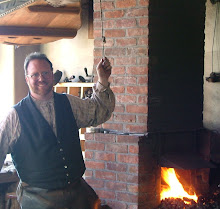Blacksmiths are under-represented in our literature, history books, and stories. The village blacksmith is now part of history. But there are some great stories about blacksmiths if you know were to look. The story below is about real people, but I suspect it has been remembered with a little more flair than accuracy. It is a great story.
ONE of the famous duelists of early New Orleans was Bernard Marigny, a member of one of Louisiana's oldest and most influential families, who was a master swordsman and a crack shot with a pistol. He was elected to the state Legislature in 1817 as a member of the House of Representatives and took an active and a leading part in the many disputes that arose between the Creoles and the Americans. At the same time Catahoula Parish was represented by James Humble, a blacksmith and a former resident of Georgia, who was noted for his great stature -- he stood almost seven feet in his stockings. The Georgian replied to one of Marigny's most impassioned speeches, and made various allusions so pointed and personal that the Creole considered himself grievously insulted, and challenged the blacksmith to a duel. Humble sought the advice of a friend.
"I will not fight him," he said. "I know nothing of this dueling business." "You must," his friend protested. "No gentleman can refuse a challenge." "I'm not a gentleman," Humble retorted. "I'm only a blacksmith."
HUMBLE was assured that he would be mined both politically and socially if he declined to meet the Creole. His friend pointed out that as the challenged person the blacksmith had the choice of weapons and could so choose as to put himself on equal terms with his adversary.
HUMBLE considered the matter for a day or two and then sent this reply to Marigny: "I accept your challenge, and in the exercise of my privilege, I stipulate that the duel shall take place in Lake Pontchartrain in six feet of water, sledge-hammers to be used as weapons."
SINCE Marigny was less than five feet and eight inches tall and so slight that he could scarcely lift a sledge-hammer, this was giving Humble an equal chance with a vengeance. The Creole's friends urged him to stand on a box and run the risk of having his skull cracked by the huge blacksmith's hammer, but Marigny declared that it was impossible for him to fight a man with such a sense of humor. Instead he apologized to Humble, and the two became firm friends.”
Quoted from Great American Folklore : legends, tales, ballads, and superstitions from all across America. Compiled by Kemp P. Battle ; illustrated by John M. Battle. Garden City, N.Y. : Doubleday, c1986. Pg. 121, 122.

No comments:
Post a Comment